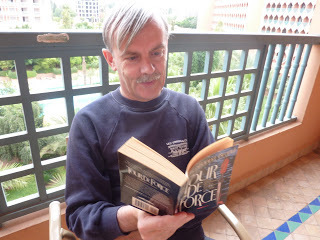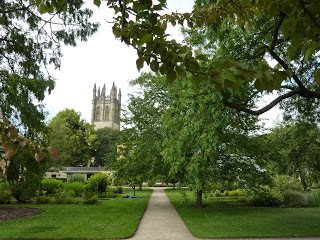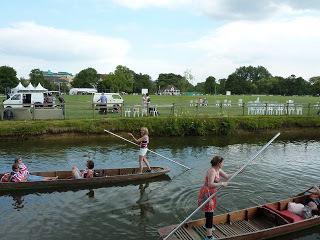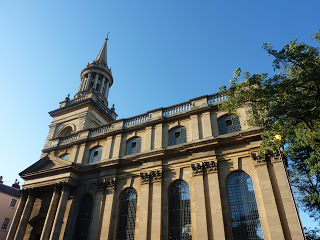Martin Edwards's Blog, page 255
November 20, 2011
Festival Time
I seem to be here,there and everywhere at the moment. Yesterday was truly enjoyable: I visited a pleasant library withaccompanying museum in Buckley, North Wales, and next week-end I'll be up in theNorth East.
I've been invited to participatein the Newcastle Winter Book Festival, and next Saturday I shall be involved intwo events. Both are to be held at a fabulous venue, the Lit and Phil, anamazing and atmospheric library which I last visited nearly three years back. In the afternoonI'll be giving a talk on Agatha Christie and Golden Age detective fiction, andin the evening, there will be the premiere of a brand new interactive murdermystery event that I've just written.
But there's much, much moreto the Festival than my two events. The programme is packed and impressive andI'm gratified to be part of it. As well as my Murder Squad mates Chaz Brenchleyand Ann Cleeves, events will feature the likes of M.C. Beaton, Allan Massie and TamDalyell.
This is the first yearof the Festival and I hope it gets plenty of support so that it grows and grows in the years ahead. If you are in that partof the world, do check it out.
Published on November 20, 2011 11:39
November 18, 2011
Forgotten Book - Plain Murder
I so much enjoyedreading the re-discovered crime novel by CS Forester, The Pursued, that Idecided to have another look at his second novel of psychological suspense,Plain Murder, which was first published in 1930. It is a book which, like hisdebut, Payment Deferred, has tended to be forgotten by crime fans – but itcertainly does not deserve such a fate.
I first read PlainMurder as a teenager, shortly after being blown away by the brilliance, as itseemed to me, of Payment Deferred. Perhaps inevitably, it suffered bycomparison with its remarkable predecessor, and I have said as much once ortwice in articles I've written over the years. But I'm now tempted to revise myopinion to some extent. The finale of this story is not quite as dazzling andoriginal, but the book as a whole is short, snappy and highly enjoyable.
Three advertising menhave been discovered by their boss in a minor fiddle. They face the sack, andthe poverty that dismissal for gross misconduct almost always meant in 1930.The ringleader, Charlie Morris, persuades his colleagues to help him kill theboss, and they duly get away with murder. However, the crime feeds Morris'egotism, and he finds himself on a downward spiral of homicide.
One of the strikingfeatures of the book is the well-realised office setting. I can think of veryfew office-based mysteries written before 1930 – any suggestions? Certainly,Forester anticipated Dorothy L Sayers, who published Murder Must Advertisethree years later. Her enjoyable novel is much better known than Forester's, butI do wonder if his book to some degree inspired hers.
Published on November 18, 2011 01:00
November 16, 2011
London Boulevard - film review
It's not very easy fora gangster film to avoid cliches of the genre, and I was rather worried whenthe 2010 movie London Boulevard began in a way strongly reminiscent of TheItalian Job. A London criminal (Colin Farrell, rather than Michael Caine) isreleased from prison, and a celebration is laid on for him by his friendsbefore he is offered the opportunity of "one more job".
At this point, however,the script takes off. It is based on a novel by Ken Bruen and the title is aspin on Sunset Boulevard. A pretty girl introduces Farrell to a retiredactress, and he takes on the task of looking after her at a time when she isbesieged by the paparazzi. But the actress is no Norma Desmond – she's playedby Keira Knightley.
Unfortunately, Farrellgets mixed up with the activities of a tough criminal played by (inevitably?)Ray Winstone, and before long he has good cause to be worried about the safetyof his beautiful but totally flaky sister – a very good part for yet anothergorgeous actress, Anna Friel. The plot developments come thick and fast asFarrell also sets out to avenge the brutal murder of a disabled friend of hisby a couple of young hoodlums. An irony of the story is that, on one occasionwhen Farrell resists the urge to mete out violent retribution, he lives toregret it.
There is a good deal ofviolence in this film, but the quality of the screenplay is such that it neverseems to become gratuitous. I've read a number of deeply unenthusiastic reviewsof this film, but the negative reaction of some critics really surprises me. Ithink London Boulevard is one of the best films about gangsters that I've everseen.
Published on November 16, 2011 00:30
November 15, 2011
Marrakech and Murder



I'm just back from aquick trip to – of all places – Africa. Morrocco, to be specific, and Marrakechto be even more precise. It was really an impulse decision to go off for a longweek-end in search of a bit of sun before the run-in to Christmas, and veryenjoyable it was too. I've never been to Africa before, but I was very takenwith what I found.
I can't recall everreading a crime story set in Marrakech, though I'm sure there must be some;perhaps my memory is at fault. Any suggestions of titles? I'd really like totry a book set there. And there are surely bound to be plenty of thrillers set inMorocco. Certainly, it's an atmospheric city; the souks are amazing, and I alsosaw my very first snake charmer. Not that I took a photo of the snakes, mind;you never know how they might react!

I read two contrastingbooks on the trip. I'll be reviewing both The Players and the Game byJulian Symons and Tour De Force by Christianna Brand shortly. I'd read theSymons before but admired it all over again. Both books were highly ingenious –but Symons' cleverness at plotting is sometimes overlooked by those who focusmainly on his criticisms of some classic detective novelists.
As for Brand – my feelingsare mixed, in that I admire her work a good deal, yet find some of her writingrather frustrating. She and Symons were friends and contemporaries, but she washurt when he gave one of her books a less than glowing review. He described her approach as "hectic", whichisn't the adjective I'd use, but there are, I think, reasons why she is muchless well remembered today than her talents would have justified. More of thisanother day.
Published on November 15, 2011 10:03
November 14, 2011
Betty Fisher movie review
When I visited John Curran in Dublin, I had not only the chance to admire his book collection, but also his very wide-ranging collection of DVDs, and he recommended a number of films to me that I'd never even heard of before. Among them was a French film, directed by Claude Miller with the frankly unpromising title Betty Fisher and Other Stories.
I was startled to find that the film is based on a novel by Ruth Rendell. The source book is Tree of Hands, a suspense story I enjoyed reading when it first came out. But that was a long time ago, and I must admit I've forgotten how the story goes. That was probably an advantage, given that Betty Fisher focuses on the core themes, but with many changes of detail.
To some extent, it's a story about maternal instincts, as well as about grief and guilt. Betty is a successful novelist with a crazy mother. When her son dies in an accident, her mum kidnaps another child, whose mother is an occasional prostitute, and who doesn't seem to miss him much. The strands of the two women's lives intertwine time and again, ultimately with bloody results. The use of coincidence is very typical of Rendell, but the treatment somehow seems very Gallic, and the effect is rather stylish.
It's one of those films where you really can't be sure what is going to happen. I found I just about believed in the story, despite various implausibilities, and it certainly kept me gripped from start to finish. An odd movie, perhaps, but a good one. John is a sound judge!
Published on November 14, 2011 00:57
November 11, 2011
Forgotten Book - The Pursued
My forgotten book fortoday is a rarity – a lost book that has just resurfaced and been published forthe very first time, 76 years after it was written. The Pursued is the thirdcrime novel C.S.Forester wrote before he turned his attention away from thegenre.
His crime debut,Payment Deferred, is a bleakmasterpiece, and Forester really could write – anyone who dismisses him becausehe is best known for his naval tales about Horatio Hornblower is making amistake, in my opinion. In The Pursued, he evokes the desperate gentility of suburbanlife between the wars with great skill, and his characterisation is excellent.
Marjorie Graingerreturns home one night to find that her sister Dot has gassed herself. Atleast, the inquest verdict is suicide, but it turns out Dot was pregnant, andMarjorie begins to fear that her randy, aggressive husband Ted was responsiblefor both the pregnancy and the death. But Marjorie is a weak woman in manyways, unwilling to act. Very different is her mother, Mrs Clair, who embarks ona relentless yet ultimately incoherent plan to achieve revenge....
This is a terrificread, with elements drawn from true crime cases, including the Crippen story. Idid feel that the latter stages of the novel were rather hurried, as thoughForester wanted to get back to his naval stories. But I really enjoyed ThePursued and to my mind it's a milestone in the genre's history. Thank goodnessthe manuscript, lost for so many years, finally turned up.
Published on November 11, 2011 00:30
November 9, 2011
Paranormal Activity
Paranormal Activity is a low-budget movie that has achieved a great deal of popularity. Rather like The Blair Witch Project, it's a wobbly-camera film, with little-known actors. And it's also quite good at building suspense.
The set-up is simple. A young couple, Katie and Micah, have moved in to a nice new home, only to find that Katie is pursued by the eponymous activity. They call in an expert, only to find him less than helpful. Micah's big idea is to buy a camera so that he can film whatever is happening in their home. And the action takes place through the camera lens. So we get a great deal of inactivity, punctuated by bursts of drama.
The relationship between the characters is well done, and in many ways is the best part of the film. As doubts rise to the surface, their contented life together comes under fatal pressure. This is at least as gripping as what is happening in the house, which – one guesses – will not be clearly explained at the end.
I thought this was a good film, although not as brilliant as its reputation might suggest. Perfectly watchable, though, and with a climax that leaves the way open for a sequel.
Published on November 09, 2011 02:00
Bruce Montgomery/Edmund Crispin
Bruce Montgomery was the real name of the detective novelist Edmund Crispin, who wrote his first novel while he was still an undergraduate at Oxford. I read his most famous book, The Moving Toyshop, when I was about 14, some time before I thought about going to university. It's a book full of high spirits, which makes good use of the Oxford setting. It appealed to me more than Gaudy Night, that's for sure.
Crispin was influenced by John Dickson Carr, rather more than by Michael Innes, who wrote even more stories with an Oxford background, and I must say Carr is more to my taste than Innes, because the mystery plots are more compelling. But Crispin produced nothing for many years, and when his amateur sleuth Gervase Fen finally reappeared, I found The Glimpses of the Moon a sad disappointment.
David Whittle's sympathetic biography, Bruce Montgomery/Edmund Crispin: a life in music and books, explains the downward trajectory of his subject's life. He was an alcoholic, who suffered a good deal of ill health in his later years. It's a sad story, and his rather inept love life sounds rather depressing.
And yet he achieved a good deal. Not only those excellent early mysteries (though as a crime novelist he was burned out at 30) but also light music - he wrote often for films, including Carry On and Doctor movies. He was friendly with Kingsley Amis and Philip Larkin, and in some ways as talented. Whittle gives a good deal of insight into a life that began brilliantly, but all too soon entered a decline. A pricey but worthwhile biography.
Published on November 09, 2011 00:37
November 7, 2011
Wake Wood - movie review
It's a long time sinceI read much horror fiction, although in my teens I devoured a number of theshort story collections published by Pan, Faber and Fontana. As for horror films, manyof them seem obsessed with gore and violence, so I usually give them a miss.But fictional horror at its best can be terrific, as Mary Shelley, Robert LouisStevenson and others have shown.
My favourite horrormovie is The Wicker Man, and the very recent film Wake Wood does have someechoes of its brilliant predecessor. The only daughter of a vet and pharmacistis mauled to death by a dog, and in an attempt to cope with their overwhelminggrief, the couple move to a small and remote village where they can try torebuild their life together.
However, it soonbecomes clear that there are dark goings-on in the nearby woods. Somehow, thevillagers have discovered the secret of bringing a person who has died withinthe last 12 months back to life – but for three days only. And there are somerather spooky conditions to be met by anyone who wants to avail themselves ofthis chance to say goodbye for the last time.
Needless to say, thecouple cannot resist temptation, and enter into a sort of Faustian pact, whichhas foreseeably terrible consequences. It's hokum, of course, but donesurprisingly well, and the final scene is genuinely memorable and chilling.Much of the power of the film derives from the performances of Aidan Gillen andEva Birthistle as the bereaved couple, and of Timothy Spall, who presides overthe village's rituals with a mixture of geniality and menace that avoids therisk of over-acting the part into absurdity. Although there are some graphicscenes, I would recommend this film to horror fans. It isn't in the same leagueas The Wicker Man, but it's still a pretty good example of its kind.
Published on November 07, 2011 14:00
November 6, 2011
Oxford Today and Crime Fiction Reviews


Why is it that somebooks attract more attention than others? I'm not sure there's a definitiveanswer. I've written at least one book – Take My Breath Away – that I thought wasgood but which made little impression on reviewers. But, thankfully, the LakeDistrict Mysteries have done better. And, when you've been around for a longtime, it is often hard to get attention for your work.
The Hanging Wood hasnow become one of my more successful books in terms of reviews. It's attractedfavourable attention in The Times and The Literary Review, a column in TheGuardian, and pleasing comments elsewhere, here, in the US, and on Amazon. And now it's been highlighted inOxford Today, a glossy magazine with a big readership: "stylish writing and agripping plot make the perfect crime thriller."

I'm very gratified,since reviews do matter. And the merit of positive reviews is that they aregood for morale and motivation. There's no doubt that, this week-end, I'llwrite with greater zest because of this latest review.
And this is something Ibear in mind when reviewing the books of others, especially those of livingwriters. It's not about offering constant praise without a single caveat,because that tends to devalue the review. But I do like to look for thepositives, especially with writers who aren't best-sellers, and who deserve tobe better known. Above all, I think it's right to try to review a book on thebasis of what it is trying to achieve, rather than what it isn't.
Published on November 06, 2011 11:59



